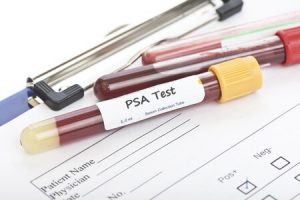Prostate cancer isn’t fun for anyone, and even the test for it is problematic. It often involves an unnecessary biopsy, and even for those who do test positive for prostate cancer, its growth is often so slow and the treatment so awful some men decide to do nothing about it.
For these reasons and others, in 2012 the U.S. Preventive Services Task Force advised against doctors giving routine PSA, prostate-specific antigen tests. But now the Task Force is considering an about-face and recommending the test again for men ages 55 to 69.

The treatment for prostate cancer can be brutal. Impotence, damaged bowels and incontinence or other trouble urinating can be long-term effects of radiation and surgery. What’s more, about 70 percent of men who have elevated PSAs do not even have prostate cancer once they are biopsied.
“The PSA test is not a great test,” said Dr. Kirsten Bibbins-Domingo in an interview with CNN. “We were very concerned in 2012 that many, many men were being treated for prostate cancer. The balance has shifted and now we can recommend that men have a conversation with their doctors about screening.”
Related: Eating Less Salt Could Mean Fewer Midnight Bathroom Trips
The latest prostate testing guidelines proposed by the Task Force read:
- The decision about whether to be screened for prostate cancer should be an individual one. The USPSTF recommends that clinicians inform men ages 55 to 69 years about the potential benefits and harms of prostate-specific antigen (PSA)–based screening for prostate cancer.
- Screening offers a small potential benefit of reducing the chance of dying of prostate cancer. However, many men will experience potential harms of screening, including false-positive results that require additional workup, overdiagnosis and overtreatment, and treatment complications such as incontinence and impotence.
In October, research came out showing that doctors can safely monitor a patient’s prostate cancer without an urgency to treat it.
Much of the hysteria about the need for a prostate exam has come from celebrities who have come forward to discuss the issue. Many times, celebrities are paid to endorse health-related treatments.
The October study showed that only about 1 percent of men died of prostate cancer during a 10-year period, with no major difference between those who were treated and those whose doctors simply kept a watchful eye. “The authors calculated that a surgeon would need to perform 27 prostate removals to prevent just one case of the cancer spreading to other areas.”
Related: Yoga May Improve Side Effects of Prostate Cancer Treatment
A professional journalist nearly 30 years, David Heitz started his career at the Quad-City Times in Davenport, Iowa before moving to Los Angeles. He led the Glendale News-Press to best small daily newspaper in the state (CNPA) as managing editor and also worked as executive news editor of the Press-Telegram. He worked briefly as deputy news editor of the Detroit News before returning to the Quad-Cities, where he has worked as a freelance medical writer since 2012 for several national websites. He recently purchased his childhood home and says he truly is “living the dream.”


![How To: ‘Fix’ Crepey Skin [Watch]](https://cdn.vitalupdates.com/wp-content/uploads/2017/05/bhmdad.png)












